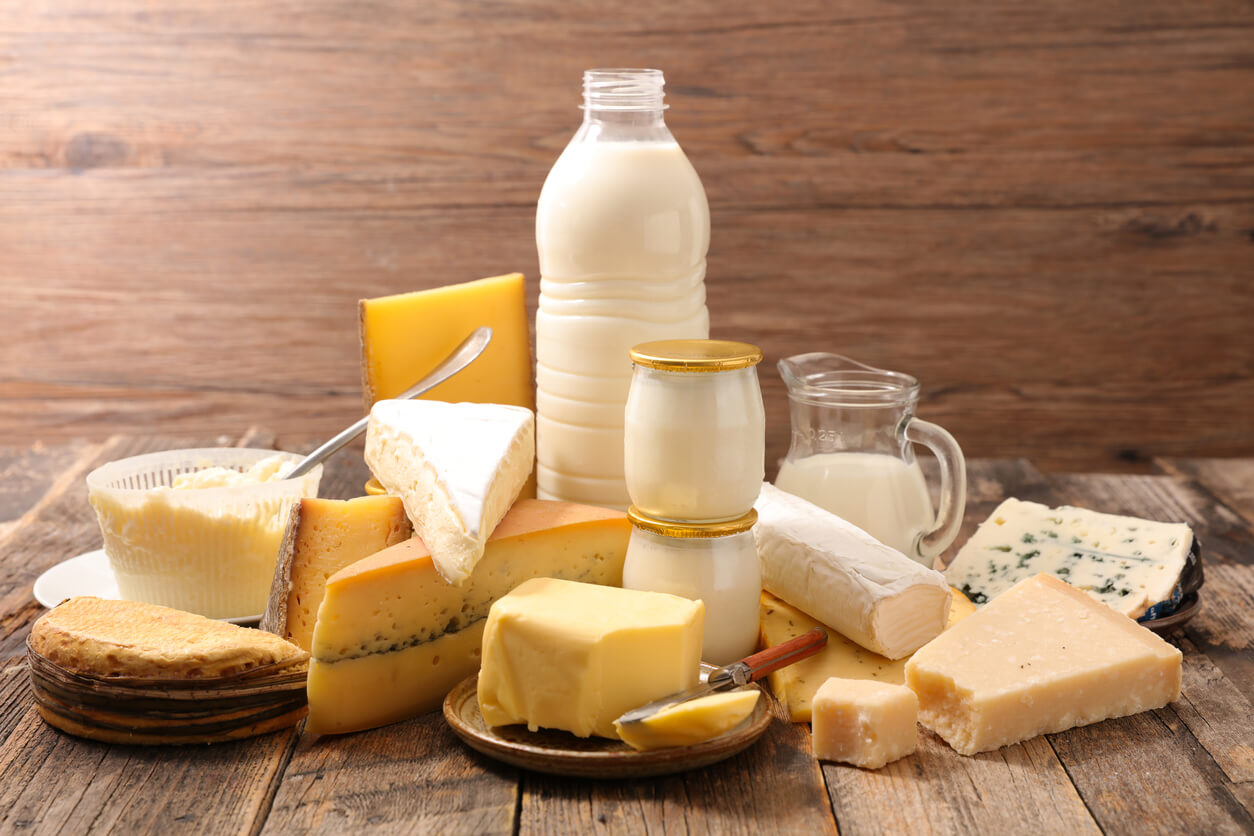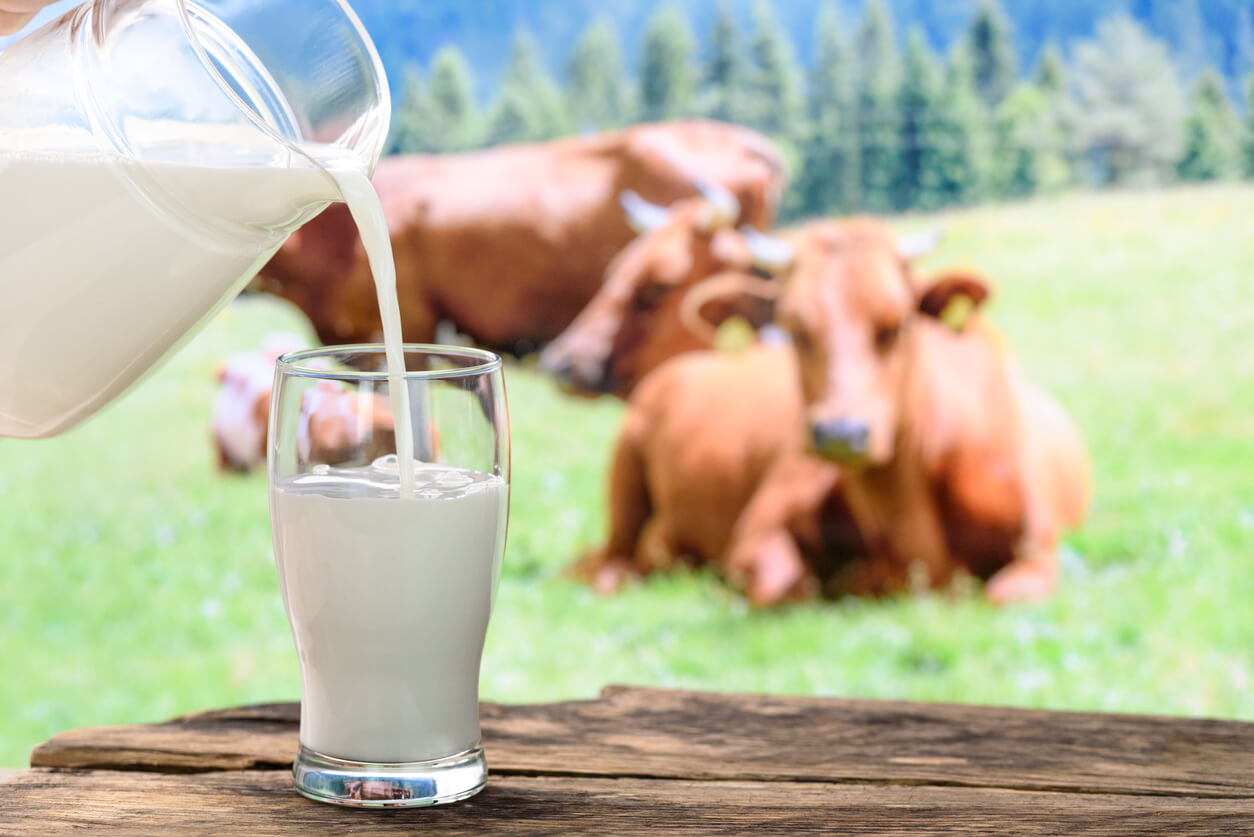The Risks of Unpasteurized Dairy Products During Pregnancy

Consuming unpasteurized dairy products during pregnancy is a high-risk dietary behavior since these foods could contain microorganisms that are potentially harmful to maternal and fetal health. It’s true that, in the case of healthy people with good hygienic guidelines, food poisoning is rare, but during pregnancy, it’s best to avoid it as much as possible.
Before starting, we need to emphasize the need to reinforce hygiene habits when preparing or consuming food at this stage. Pregnant women are considered risk groups, so they should be especially careful with the consumption of food of animal origin.
Unpasteurized dairy products should be avoided during pregnancy!

As mentioned above, unpasteurized dairy products can contain harmful bacteria, such as Listeria monocytogenes. This microorganism is capable of causing serious problems in the fetus and even favoring miscarriage. When this outcome doesn’t occur, it can increase the risk of future sequelae in the child, as stated in a study published in the Archives of Gynecology and Obstetrics.
In fact, intestinal infections caused by contaminated food can lead to the need to prescribe antibiotic treatment for the mother. For this reason, in pregnancy, it’s best to opt for prevention and avoid the consumption of raw milk and all products derived from it. Some cheeses, such as blue cheese, and homemade yogurt, should be restricted.
The good news is that current pasteurization mechanisms are capable of killing this type of pathogen and ensuring the safety of milk for pregnant women. Normally, this type of bacteria doesn’t survive the heat treatments applied in these processes.
What to do in case of contamination from the consumption of unpasteurized dairy products?
It may happen that unpasteurized milk or a dairy product made with this product is accidentally consumed during pregnancy. In this case, it’s essential that you go to the doctor as soon as possible, at the slightest gastrointestinal symptom.
The specialist may prescribe certain drugs as a preventive measure to limit the passage of the bacteria through the placenta.
In any case, it should be noted that Listeria isn’t only found in raw milk but can also be present in other contaminated foods, such as vegetables. This is confirmed by research published in the Journal of the National Medical Association. For this reason, a series of appropriate hygiene practices should always be maintained when preparing food.
It’s essential to wash the food you’re going to consume thoroughly, as well as the utensils with which it will be handled. Afterward, it’s best to cook foodstuffs well, especially those of animal origin.
In the case of eating out, you should avoid preparations that are based on raw meat or fish, such as sushi.

Experts recommend avoiding unpasteurized milk during pregnancy
As we’ve already mentioned, it’s essential to avoid the consumption of unpasteurized dairy products during pregnancy. Otherwise, you run a high and avoidable risk.
Also, it’s always advisable to adopt good hygienic practices when handling or cooking food in order to opt for prevention rather than treatment. Keep in mind that this type of intoxication is conditioned by errors at the time of preparation.
Finally, keep in mind that you need to restrict certain foods during pregnancy so as not to endanger the health of the fetus. This won’t lead to a nutritional deficit, as your diet can maintain an adequate variety. Just be careful with raw animal products and sausages, as they are the reservoirs of the main pathogens.
Consuming unpasteurized dairy products during pregnancy is a high-risk dietary behavior since these foods could contain microorganisms that are potentially harmful to maternal and fetal health. It’s true that, in the case of healthy people with good hygienic guidelines, food poisoning is rare, but during pregnancy, it’s best to avoid it as much as possible.
Before starting, we need to emphasize the need to reinforce hygiene habits when preparing or consuming food at this stage. Pregnant women are considered risk groups, so they should be especially careful with the consumption of food of animal origin.
Unpasteurized dairy products should be avoided during pregnancy!

As mentioned above, unpasteurized dairy products can contain harmful bacteria, such as Listeria monocytogenes. This microorganism is capable of causing serious problems in the fetus and even favoring miscarriage. When this outcome doesn’t occur, it can increase the risk of future sequelae in the child, as stated in a study published in the Archives of Gynecology and Obstetrics.
In fact, intestinal infections caused by contaminated food can lead to the need to prescribe antibiotic treatment for the mother. For this reason, in pregnancy, it’s best to opt for prevention and avoid the consumption of raw milk and all products derived from it. Some cheeses, such as blue cheese, and homemade yogurt, should be restricted.
The good news is that current pasteurization mechanisms are capable of killing this type of pathogen and ensuring the safety of milk for pregnant women. Normally, this type of bacteria doesn’t survive the heat treatments applied in these processes.
What to do in case of contamination from the consumption of unpasteurized dairy products?
It may happen that unpasteurized milk or a dairy product made with this product is accidentally consumed during pregnancy. In this case, it’s essential that you go to the doctor as soon as possible, at the slightest gastrointestinal symptom.
The specialist may prescribe certain drugs as a preventive measure to limit the passage of the bacteria through the placenta.
In any case, it should be noted that Listeria isn’t only found in raw milk but can also be present in other contaminated foods, such as vegetables. This is confirmed by research published in the Journal of the National Medical Association. For this reason, a series of appropriate hygiene practices should always be maintained when preparing food.
It’s essential to wash the food you’re going to consume thoroughly, as well as the utensils with which it will be handled. Afterward, it’s best to cook foodstuffs well, especially those of animal origin.
In the case of eating out, you should avoid preparations that are based on raw meat or fish, such as sushi.

Experts recommend avoiding unpasteurized milk during pregnancy
As we’ve already mentioned, it’s essential to avoid the consumption of unpasteurized dairy products during pregnancy. Otherwise, you run a high and avoidable risk.
Also, it’s always advisable to adopt good hygienic practices when handling or cooking food in order to opt for prevention rather than treatment. Keep in mind that this type of intoxication is conditioned by errors at the time of preparation.
Finally, keep in mind that you need to restrict certain foods during pregnancy so as not to endanger the health of the fetus. This won’t lead to a nutritional deficit, as your diet can maintain an adequate variety. Just be careful with raw animal products and sausages, as they are the reservoirs of the main pathogens.
All cited sources were thoroughly reviewed by our team to ensure their quality, reliability, currency, and validity. The bibliography of this article was considered reliable and of academic or scientific accuracy.
- Madjunkov, M., Chaudhry, S., & Ito, S. (2017). Listeriosis during pregnancy. Archives of gynecology and obstetrics, 296(2), 143–152. Disponible en: https://doi.org/10.1007/s00404-017-4401-1
- Serventi, L., Curi, B., Johns, R., Silva, J., Bainbridge, R., & Gaither, K. (2020). Pregnancy Complicated by Listeria Monocytogenes: A Case Report and Review of the Literature. Journal of the National Medical Association, 112(4), 428–432. Disponible en: https://doi.org/10.1016/j.jnma.2020.05.002
This text is provided for informational purposes only and does not replace consultation with a professional. If in doubt, consult your specialist.








